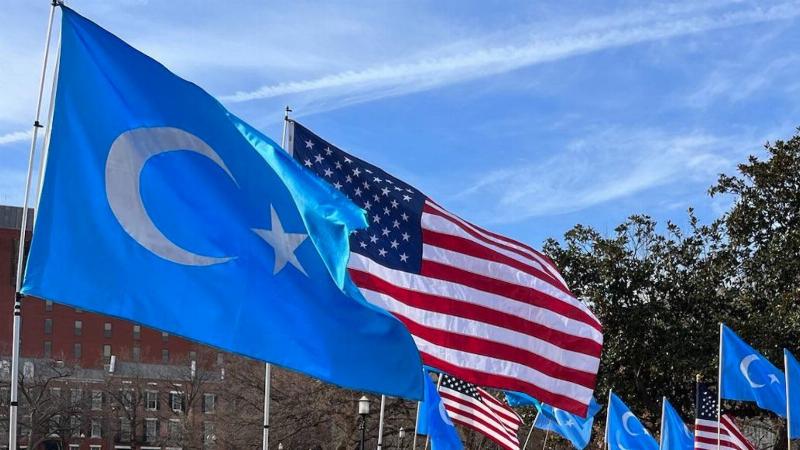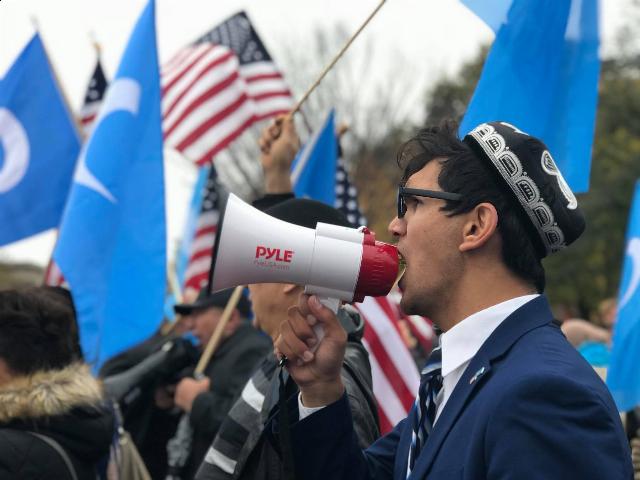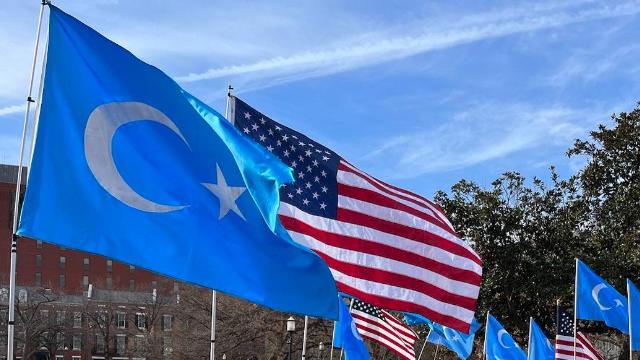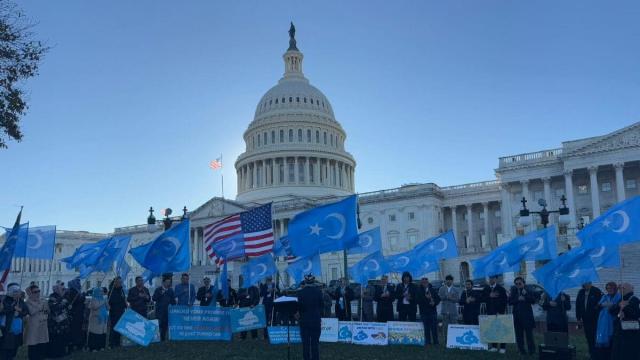


Numerous recent reports are urging President Trump to recognize Somaliland as an independent country. During his press conference with the presidents of Armenia and Azerbaijan, and his help in brokering their peace, a reporter asked him about Somaliland as well. President Trump, positioning himself as a true dealmaker, producing peaceful agreements among long-time warring factions throughout the world, holds an enviable and estimable opportunity to help strengthen these fledgling nations.
East Turkistan is another country yearning for freedom, located east of Kazakhstan in Central Asia. Currently occupied by the Republic of China, and labeled the Xinjiang Uyghur Autonomous Region, most of the world has never heard of this country because of the Chinese government’s ethnic cleansing and propaganda war of suppression and secrecy.
But you have heard of the Uyghurs, for sure.
Many Americans remember the activism of Enes Kanter Freedom, the Turkish-American NBA star who frequently decried the abuses of the Chinese government against the Uyghurs of Western China. Their nation is East Turkistan, and they are still persecuted by Communist China while seeking self-determination once again.
On July 25, 2025, I interviewed Salih Hudayar, the foreign minister of the East Turkistan Government in Exile. Besides going into great detail about his life, he discussed the culture and cause of his people to regain their sovereignty.

Salih Hudayar.
Seated in his government’s Washington, D.C. office, with pictures of his country’s heroes in the background, Hudayar shared that he was born in Artush, East Turkistan. His father fled to the United States in 1998 as a political refugee, and in June 2000, Hudayar and his family joined him with the help of the U.S. Embassy in Beijing. They settled in Oklahoma, where there was already a small community of Uyghurs from East Turkistan, including people his father knew. When asked about his childhood in his native country, Salih recalled vivid childhood memories, including Muslim celebrations; family gatherings; and, sadly, the Chinese military raid on his home due to his uncle’s simply having read a book about East Turkistan’s independence.
The sustained existence of the East Turkistan government has not been without its challenges. The region was initially part of the Soviet sphere of influence but maintained its distinct identity and relative independence. The Soviet Union assassinated the leadership of the Second East Turkestan Republic in 1949 to prevent resistance to the impending Chinese invasion in conjunction with Chinese communist leader Mao Zedong’s ascent to power. To this day, the Uyghur people have little in common with the Han Chinese, all the more undermining the Chinese government’s forced union as part of “Western China.”
Following a widespread diaspora after China’s occupation in 1949, surviving leaders of the Second East Turkistan Republic established the East Turkistan National Committee in 1962 in Almaty, Kazakhstan (then part of the former Soviet Union) as a de facto government in exile. After East Turkistan advocacy was banned in Central Asia in 1998, the movement began shifting westward, leading to the creation of the East Turkistan Government in Exile in 2004, headquartered in Washington, D.C., in part because fellow Turkic nation Turkiye refused to host them.
Hudayar noted that the Muslim world in general, and Turkic nations in particular, have remained aloof or downright hostile to the plight of the Uyghurs. While they support a “Free Palestine,” none of them supports an actual people group with historical independent status, language, and culture. Why? They participate in (and depend on) China’s Belt and Road Initiative.
Despite betrayals from communist leaders, fellow Muslim governments, and their fellow Turkic states in Central Asia, Uyghurs in exile remain committed to a restored East Turkistan. When asked what brought their plight international attention, Hudayar discussed the growing awareness of China's atrocities in East Turkistan, including forced assimilation and genocide, after the Trump administration raised awareness during his first term of their plight.

Specifically, the Chinese communist government has been destroying the East Turkistan people’s ancestral homes and landmarks. They routinely force them into concentration camps, arbitrarily accusing them of violent insurrection, terrorism, and general civil disobedience. Hudayar believes that hundreds of Uyghurs are dying in the 1,200+ camps and prisons daily, and their bodies are burned in local crematoria. In 2019, it was reported that some 150 Uyghurs died over six months in one concentration camp alone. American experts on organ-harvesting have testified before Congress that an estimated 25,000 to 50,000 Uyghurs are killed for their organs each year. Despite these reports, China has announced plans to triple the number of organ-harvesting facilities across East Turkistan.
They also sterilize Uyghur women so that they do not usher in future Uyghur generations. Mobilizing deceptive propaganda to its fullest, the Chinese government shows controlled areas in the region to foreign visitors, forcing Uyghurs to pretend to be content. China has allowed some Uyghurs to leave the region, but only if they spy on diaspora communities and sign documents agreeing to avoid political activities.
From a moral basis alone, the world should care what is happening to Hudayar’s countrymen. However, how is the East Turkistan Government in Exile making its case to the world, particularly the United States, to recognize East Turkistan as a sovereign state once again? Western powers want to limit China’s overwhelming and menacing influence in the world. East Turkistan is China’s weak spot. The region’s strategic importance as China's gateway to Central Asia, South Asia, and Europe, and its role in China’s Belt and Road Initiative and military capabilities, mean that China must reduce all conflicts and impose complete dominance. China’s genocidal campaign against the Uyghurs is a safeguard for potential future conflicts, particularly with the United States and India. China’s designs on Taiwan have been put on hold, for example, until it has the Uyghur population in East Turkistan.

President Trump has brokered unprecedented peace deals in just six months. He is building international goodwill, brokering peace deals between long-time enemies: Congo and Rwanda, Thailand and Cambodia, Armenia and Azerbaijan, and the growing list of Arab states recognizing Israel and joining the Abraham Accords.
Yet China remains the overarching adversary to the United States, and international accords will not suffice.
President Trump should recognize the sovereignty of East Turkistan and support the recovery of its liberty and independence, consistent with the principles expressed in the United States’ Captive Nations Law, which outlined a fervent commitment to helping all states under (prior) Soviet rule to have their freedom restored.
Trump’s bold diplomatic move to recognize East Turkistan will face greater pushback, since China still dominates the region, and member countries depend on the communist government’s Belt and Road investments. Nevertheless, any effort that undermines the Chinese government’s illegitimate hold on East Turkistan will be a bigger move for great peace in the region and stronger American (and Western) standing in the world. At the very least, Trump can state his affinity for the plight of the Uyghurs, demand an end to their persecution, and ratchet up his soft-power sanctions on China to address this problem.
Salih Hudayar and his exile government colleagues will be waiting. The rest of the world should urge President Trump (and other Western countries) to recognize a Free East Turkistan and help end China’s globalist dominance.
Arthur Christopher Schaper is a writer, blogger, and political commentator on topics both timeless and timely; political, cultural, and eternal. Arthur is also the field director for the international pro-family group MassResistance. He is a lifelong Southern California resident. Arthur currently lives in Torrance. He can be contacted at arthurschaper@hotmail.com.
